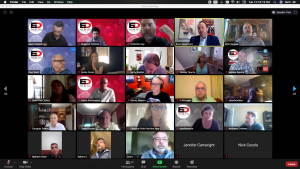As of May 20, all 50 states reopening in some fashion, though restaurants and bars seem to lag other industries across the board. For clubs across the US — when they do open — a new environment will greet club owners/operators, staff, entertainers, and customers.
With the threat of catching the virus as a looming risk for everyone involved, how will this threat be reflected in insurance coverage? Will clubs need to have a separate coverage related to the coronavirus, and if so, what exactly will it be? Or does the current insurance coverage protect the owner/operator? This was the subject of the ED Webcon on Tuesday, May 19.
Joining the call to answer these questions were insurance agents: Brian Bazemore of Marsh and McLellan, John Jacquat of Pure Risk Solutions, Sherri McCullers of Coast to Coast Insurance, and Grant Veitch of Associated Underwriters. Pike Barber, Hospitality Insurance Agency, was set to join but was unable to due to technical difficulties. (See contact details and resources at the bottom of this article)
Q: “Will insurance coverage need to change as clubs open due to the coronavirus?”
BAZEMORE: “I think definitely, it will change. It’s going to become more restrictive,” said Bazemore. “We’re already seeing some pandemic exclusions on property policies. We’re going to see varying states make decisions to include or exclude coronavirus coverage from worker’s compensation. It’s going to be on a state and local level until federal steps in. We’ll see that eventually, I think it’ll be something similar to what we saw with terrorism post 9/11. There will definitely be changes not just from a coverage standpoint, but also from a pricing standpoint. This is going to catapult us into an immediate hard-market cycle.
JACQUAT: Does something need to change before clubs reopen? No, unless they put their policy on hold or dropped it down to a premise-only type of coverage. Some of this stuff is just going to be evolving. There is a bill that looks like just like the TRIA (Terrorism Risk Insurance Act) coverage and it’ll be a pandemic risk insurance act. You’re going to see communicable-diseases exclusions on more policies than already are there. It’s definitely going to be changing. Like Brian said, the market is going to get harder because these insurance companies operate on a global level, a lot of them, and policies are written with different languages across the world and they’re responding differently.
Q: “How is insurance coverage going to react to the situation where a customer or staff says they contracted coronavirus at your club?”
BAZEMORE: “I think as owners, the responsibility is going to be heavier than ever before to follow the necessary protocols, from the CDC, local health departments. I look at this similar to a food-borne illness situation where I believe it would take more than one case, although it can’t be dismissed, but if you had several patrons or employees that your location was the only commonality, you would have a liability claim and a viable injury claim so it could potentially put your general liability policy at risk, but I think if the proper protocols are followed, I don’t think we’ll see nearly as much of that as some may expect.
JACQUAT: “It’s going to be somewhat difficult to prove that they got it there, however, if there’s true gross negligence — you knowingly have sick employees working — that brings a lot more liability into play versus following the guidelines to a tee of what’s mandated. In terms of insurance coverage, you’ve got to look at your policy. If there’s a communicable disease exclusion on there, it’s going to be a question mark if the insurance company will respond. But the recommendation is to certainly follow the guidelines in terms of your own staff managing them, and then when it gets to social distancing and things like that, you want to follow it to a tee to try and mitigate some of that stuff.

Q: “From an insurance standpoint, should clubs contact their attorneys about preparing any kind of waiver as it relates to their staff, or their entertainers or their guests?”
BAZEMORE: “I don’t think it’s a bad idea, especially in regards to your 1099 entertainers to include some wording that holds harmless the entertainers. Your staff, it’s going to depend on what the state work comp guidelines propose. I think it only comes into play when you have your 1099 entertainers that you’re excluding from your workers’ compensation coverage. At that point, I do believe it would be wise to consult an attorney and come up with harmless language within your independent contract. As far as patrons, that one’s tougher because I don’t know if you’d be calling more attention to the matter. You have to be at a higher exposure in your workplace than you would be anywhere else — for instance, a bee sting is not a compensable claim under workers’ comp coverage unless you’re in pest control.
JACQUAT: “I think it’s a good idea to talk to an attorney about all of those points, in terms of waivers on third-party liability, those differ by state on the weight they carry in courts, so that’s why you’d want to check with your attorney to see if that’s worth going through for guests or not. Another example on what Brian said on workers’ comp, normally diseases of life like the flu or cold at the work place, they can’t show where you got it, normally that wouldn’t be covered under workers’ comp. But states have come out and said COVID is covered, so that does change it for employees as a covered claim.
VEITCH: We all know we’re in unchartered territory so the market is evolving as we move on right now. Most policies have some type of exclusion, definitely the communicable disease exclusion which is on many of the policies already excludes coverage for it and we see that’s going to get more restrictive. There may be some coverage buy-back options like terrorism in the future, but I don’t even think they have their hands around what the costs are going to be to defend these claims so outright exclusions are going to be what the foreseeable future holds. From the standpoint of waivers, they’re usually always a good thing. They don’t necessarily hurt if written properly. If nothing else, they’re a good deterrent — when you go to a carwash and you see ‘We’re not responsible for damages’ keeps most people from filing claims even though they are responsible for damages, often.
Q: “Can you talk about the difference between occurrence-based and claims-made policies and which type they would need to keep enforced during shutdowns and reopening?”
VEITCH: “As far as most policies for the locations are an occurrence policy so if you cancel your policy and you had somebody say they got it two weeks ago and you had coverage two weeks ago, that’s the policy that would respond to the claim. That’s most of what these policies are, they’re not claims-made. Can you cancel your policy and raise a promise-liability policy while you’re closed? You can certainly do that. While you’re not operating, it’s just liability so basically slip-and-fall coverage for the premise and once you reopen, we can go back and reapply for coverage for operating a club.
BAZEMORE: “I don’t like the strategy to do a cancel and a rewrite in this marketplace. I just think that we all know very few markets that will entertain this business segment and if anything, we should be looking at trying to get extensions on policies, to avoid what are most definitely going to be increasing rates. I think it would be more advantageous. Your liability policies are going to be based on your revenues. If you’re shutdown, there’s no revenue. If you can defer those payments, work with your premium finance provider to defer or offset those payments until you open back up, many of the carriers are granting extensions to policies for no additional premium.
I think it’ll be something similar to what we saw with terrorism post 9/11. There will definitely be changes not just from a coverage standpoint, but also from a pricing standpoint. — Brian Bazemore, Marsh and McLellan Agency
MCCULLERS: We’re all pretty much running into the same thing dealing with the carriers. Many of the liability carriers I’ve talked to have said they’d make some considerations for the clients at audit. Nobody’s necessarily nailing down exactly what they’re going to do, but it’s something to try and help them out. I agree with Brian on not canceling and rewriting at this point because we can’t guarantee we’re going to obtain the same rates. I’m cautious about that as well.
Q: “We’ve seen commercials — albeit for a different industry — for insurance companies giving money back to clients. Is there anything that’s happening with insurance for clubs to help them out from a financial standpoint if they’re closed for three, four months?”
JACQUAT: “What we’ve seen is three different approaches from the carriers. The first is what Brian mentioned, extending policies — there’s no revenue, they’re not earning premium so the exposures are next to nothing so they extend the policy. Another is they reduce the minimum and deposit, normally the policies are right at 90 or 100% minimum and deposit, meaning at the time of the audit, they’re not going to give any money back unless it’s something less than 100% minimum and deposit. Some carriers have offered to reduce that to 90% or maybe lower as this goes on. There are also some carriers that are actually reducing the exposures, creating an endorsement of a return premium. That return premium goes back to the finance company and allows them to have more flexibility with future installments. The big thing there is it’s really tied to the finance company. You sign an agreement with the finance company to pay them back on their loan and so it’s them you have to deal with in terms of what you get from the carrier, take that to the finance company and try to negotiate.
Q: There is a multitude of types of insurance at clubs up to this date have needed — do you foresee any new types of coverages that government is going to mandate that clubs have because of the virus?
JACQUAT: “I don’t see necessarily a mandate. The mandate would come in a workers’ comp, some liquor liability is mandated, but other than that, I think it’s going to be similar to TRIA that you have an option to take or not.
BAZEMORE: “Prior to all this, our firm had a pandemic product offered through the marketplace on the back of the SARS pandemic. It was a very small, select product. It was about 85% of the limit was your premium, so a $1 million limit you were looking at $850,000 for coverage. The product was there. It was not thoroughly backed. It was a private product, reinsured. Now, I think we’re going to shift over to what I believe like John mentioned, a TRIA type scenario where it will be federally backed and federally funded and it’ll be a small premium you pay to opt into the coverage or you can elect to opt out. That would be my guess, we’ll see a small coverage option thrown in there.
Q: Has there been any movement on loss-of-income insurance?
BAZEMORE: File the claim, 100%. What we may see is that if you haven’t filed a claim and haven’t filed a claim already is that you could be excluded from coverage if there’s some federal act that says we’re going to get some coverage back where it’s been previously excluded. It’s almost 98% of policies that have an exclusion for things of this nature, so it will take a government action to unwind it, if you will, and provide coverage. But if you haven’t submitted the claim yet, do it the minute you get off this call.”
This article is provided for general information purposes only and is not intended to provide either an exhaustive analysis of these matters or any specific legal advice or recommendation. Laws vary by state and municipality. Club operators and others are strongly encouraged to consult their own attorneys and accountants for specific advice on how these issues will affect their businesses and what measures to take.
For more information be sure to follow our social media pages, including Facebook and Instagram, visit ExoticDancer.com, and email ED’s Dave Manack at dave@edpublications.com.
Brian Bazemore
Marsh and McLellan
brian.bazemore@marshmmma.com
www.marshmmma.com
; https://mma.marshmma.com/coronavirus-outbreak-resource-page
(980) 395-4240
Pike Barber
Hospitality Insurance Agency
pike@hospitalityia.com
www.hospitalityia.com
(727) 726-1112
John Jacquat
Pure Risk Solutions
john@purerisksolutions.com
www.purerisksoutions.com
(303) 834-1001
Sherri McCullers
Coast to Coast Insurance
smccullers@ctocinsurance.com
www.ctocinsurance.com
(813) 855-0600
Grant Veitch
Associated Underwriters
gveitch@associated.cc
www.associated.cc
(847) 427-3537





























